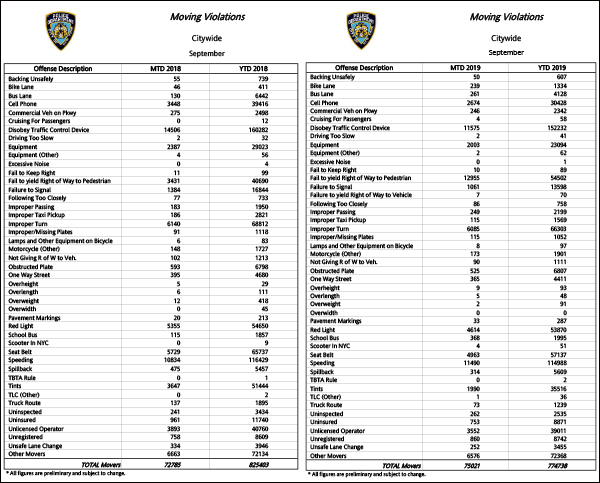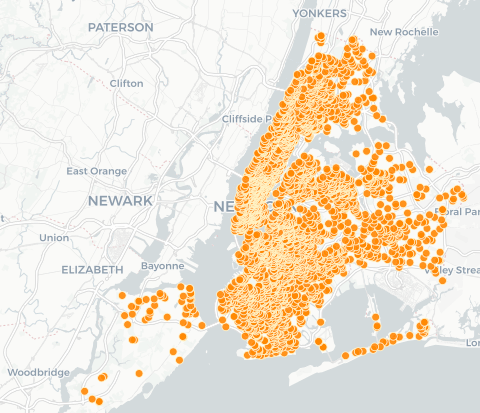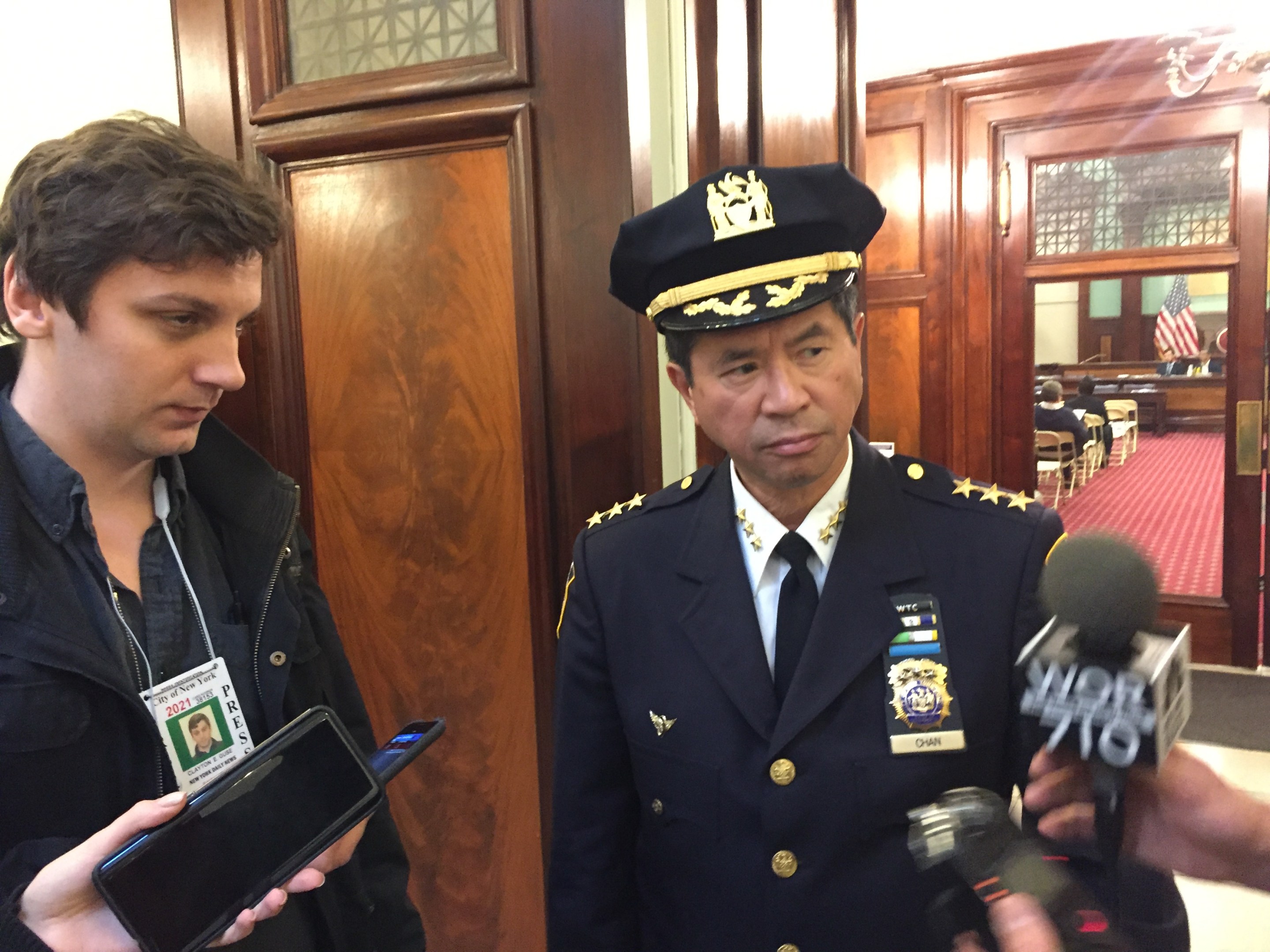Mayor de Blasio's Vision Zero blind spot with the NYPD was revealed anew at a City Council hearing on Thursday as the top-ranking transportation official in the police department — again — defended the agency's anti-cycling agenda.
NYPD Transportation Bureau Chief Thomas Chan's answers to questions from council members and reporters were frequently inaccurate, willfully unclear, and often uninformed — including his assertion that none of the 26 cyclists who have been killed this year on New York City streets was the result of a hit-and-run (there have been at least three).
Beyond that, here is a short list of Chan's shortcomings on Thursday, all of which should be addressed by the mayor:
Victim-blaming
At the hearing led by Transportation Committee Chairman Ydanis Rodriguez and Public Safety Committee Chairman Donovan Richards, Chan said the increase in cycling deaths — up from 10 in all of 2018 — could be partly on the ... rise of cycling!
“Unfortunately," he said, "as there are more bicyclists on the roadway, the contacts … increase between vehicles and cyclists."
DOT Commissioner Polly Trottenberg was forced to correct the record, saying that the increase in cycling creates a "safety in numbers" phenomenon, and that the rise in cyclist deaths is much more attributable to lack of protected bike lanes in hip areas where cyclists are relocating and the increasing presence of SUVs on city streets.
Rodriguez also disputed Chan's testimony.
"Of course the rise in cycling is not the reason," he said. "Yes, the increase of cyclists in New York City is high, but the city has not been prepared for that increase. The city has not built enough protected bike lanes. The city needs to focus on enforcement of drivers not cyclists."
Misinformation
In his testimony, Chan claimed that the NYPD has stepped up its enforcement of "blocked bike lanes ... leading to sharp increase over last year in summonses for both parking and moving bike lane violations."

There has been an increase: From January to September, 2018, the NYPD wrote just 411 moving violations in bike lanes. Over the same period this year, the agency has written 1,334 — a substantial percentage increase, but one that still represents just .4 bike lane tickets per precinct per day.
He also claimed that the NYPD is writing more tickets in the "seven most dangerous moving violations, which we refer to as Vision Zero violations." He did not specify what violations they are (nor did the NYPD respond), but the NYPD has indeed written 34 percent more tickets for failing to yield to pedestrians this year versus last.
Still, those 54,502 tickets issued between January and September represent less than two tickets per day per precinct.
The NYPD has also written more tickets this year against cyclists for missing a light or a bell.
Meanwhile, the number of tickets in the following important moving violations categories are all down (see graphic above):
- Improper turn (down 3.6 percent)
- Talking on a cellphone while driving (down 22.8 percent).
- Disobeying a traffic control device (down 5 percent)
- Red light violation, a separate category (down 1.4 percent).
- Failure to signal (down 19 percent).
- Speeding. (down 1.2 percent).
As a result, overall moving violation tickets issued to road scofflaws are down 6 percent this year.
NYPD scofflaws
Chan refused to address the NYPD's persistent and dangerous practice of illegal parking. Even car-friendly members of the City Council, including Daneek Miller, Bob Holden and Chaim Deustch*, repeatedly complained to Chan about police officers who park illegally on sidewalks, in front of hydrants, in crosswalks and on bike lanes around police stationhouses.
Chan replied that he discusses the situation with precinct commanders frequently. Yet the problem persists, so there are only three possibilities:
- Chan is lying.
- Chan is not lying that he discusses the issue with precinct commanders, but the precinct commanders are ignoring an officer of superior rank.
- Chan is not lying, but has no juice within the department to actually change the unsafe and disrespectful behavior that even NYPD supporters admit is rampant.
In any event, Rodriguez was not impressed.
"We need to see action," he told Streetsblog. "We need a better plan. What are the consequences?" (The NYPD has declined to tell Streetsblog how many officers have been disciplined for illegal parking or reckless driving.)
* Deustch has long been a reliable voice for drivers, especially when it comes to parking, but since he gave up his car in September to commute to City Hall via subway, he has more consistently called for safety protections for cyclists and pedestrians.
The staffing gap
Chan said the NYPD has the resources to conduct accurate and full investigations of a substantial number of crashes in New York City. This is simply not true.
In his testimony, Chan said the Collision Investigation Squad has a staff of 25, and "continues to vigorously investigate all fatalities, serious injuries where the individual is likely to die, and critical injuries." He later said that the CIS did about 290 investigations last year — a year when there are roughly 203 fatalities and tens of thousands of injuries.
The NYPD later said that 3,642 cyclists have been injured so far this year.

Rodriguez said the CIS is woefully understaffed and under-used.
"They should not only focus on cases when people die," he said. "If we have 4,600 injured cyclists every year, those should be investigated. And there are 4,000 hit-and-runs that should be investigated fully. The city has not done enough."
City Council Speaker Corey Johnson had proposed a significant increase in the CIS budget, allowing it to double in size, but Mayor de Blasio and NYPD Commissioner Joseph O'Neill rejected the money.
Chan's 'word salad'
Worse, of course, is Chan's inability to answer questions without a digressive, dissembling monologue that never addresses the actual question. After his testimony, he had the following exchange with Streetsblog:
Question: The New York Times reported [on Wednesday] that NYPD wrote about 72,000 red light tickets in 2018, but that 22 percent of them were to cyclists. Why is the number of red light tickets to cyclists, who you just testified are less of a danger on the streets, so high?
Chief Chan: My recollection, if I took a look, I believe, there are close to 14,000 summonses that were issued on red lights [to cyclists]. I don't have the figures in front of me. But, again, what happened is that it is just very important for all of the people who utilize the roadways to follow the rules and the regulations because again we want it safe for our bicyclists, our pedestrians and our motorists. But certainly we said this before and we testified at the council that pedestrians and cyclists are more vulnerable because they don't have a sheet of metal protecting them and safety belts and airbags. As a motorist out there, we are obligated to pay more attention and make sure that we drive safely and in a manner that does not cause injury to other people.
Question: But why are the number of tickets to cyclists so high?
Chan: When we take a look at the proportionality over the last year of total number of moving violations that are issued by the NYPD, over a million summonses, and again, when we look at the proportion of it, I don't think it's a larger amount than the rest of the public. And what can happen is these are violations where people can be injured and we don't blame people, but again it is important if your, whether a person is operating on the sidewalk, we don't expect to see motor vehicles operating on the sidewalk, or going the wrong way, going through red lights and we don't want anyone to get hurt, so ultimately we are looking for safety for all the people out there and we prefer people not go through red lights and I think that's the better way for everyone.
The transcript of the conversation above does not do it justice, so an audio tape is embedded here:
Activists were outraged by Chan's suggestion that the NYPD has found a balance in its red light ticketing of cyclists and drivers.
"That nearly a quarter of red light tickets issued by NYPD in 2018 were written to cyclists is astonishing, given the carnage that drivers wreak on city streets," said Eric McClure, executive director of StreetsPAC. "And from what we see time and again, many of the tickets given to cyclists are issued in sting operations in which no one is endangered. It would be one thing if cops were ticketing cyclists weaving through crowded Midtown crosswalks against the light, but that’s not what’s going on here. It’s a stark reminder that we need to prioritize automated enforcement in order to hold drivers accountable.
Jon Orcutt of Bike NY, who worked in the Department of Transportation under Mayor Bloomberg was equally appalled by Chan.
“This is word salad from an official caught out by data showing a gross misallocation of traffic enforcement resources,” he said.
Which is worse? Trottenberg's refusal to implicate NYPD's anti-bike culture in the cyclist-fatality epidemic, or NYPD Transpo Chief Chan's fatuous (& counter-factual) attribution of the epidemic to more cycling? Latter, I guess. (Useful background here:) https://t.co/8td6w6Opl5) https://t.co/NkWIPrTkzb
— Charles Komanoff (@Komanoff) October 24, 2019
For his part, Rodriguez declined repeated opportunities to say he had lost faith in Chan.
"I have not lost faith," he said. "But changes [in policy] have to be made. Enforcement has to be increased. We need more protected bike lanes. We need consequences for police officers who park in bike lanes. We need to stop cracking down on delivery workers, which I have seen on many occasions in my district.
"I would not judge Chief Chan only from yesterday, but he has to learn from yesterday and be better prepared," Rodriguez added. "And, most important, he needs to work with us on proper enforcement on irresponsible drivers who are hurting and killing New Yorkers."
City Hall and the NYPD declined to comment for this story.
Gersh Kuntzman is editor of Streetsblog. When he gets really angry, he writes the “Cycle of Rage” column. Prior posts are archived here.






